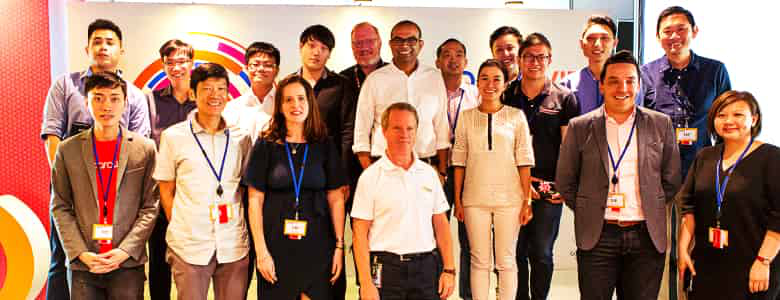Open data for worthy causes

In the quiet of a Saturday afternoon, dramatic music fills the Amazon Web Services (AWS) office in Singapore.
We’re watching a slow-motion promo video of a finalist team, complete with a smoke machine. In it, three individuals emerge from the darkness. One of them, waving a pair of nunchucks, opens his mouth in a battle cry.
Laughter rings through the room as the team — self-dubbed Team N.I.C.E.— is introduced.
They’re about to tell us about how a combination of rainfall data, water demand and public outreach can lead to a self-sustaining water supply by 2061.
But first, there’s the battle cry again as one of the team members jumps onto the stage, swinging the nunchucks.
This was among the highlights of the exciting finals of the 2017 National Data Viz Video Challenge, which banished the notion that data visualisation is boring and dull.
Organised by the Government Technology Agency of Singapore (GovTech), the competition challenged students from institutes of higher learning to work with open data, using the theme “How open data makes a difference for you and me.”
They were tasked with using datasets from any Singapore government open data portal — Data.gov.sg or LTA Datamall, for example—to come up with solutions or insights about real-life issues faced within the nation.
At the end of the afternoon, Team CEJM of Nanyang Polytechnic — consisting of Manzel Joseph Seet, Cyrus Wong Ying Chun, Esmond Ng Yong Keng and Kat Yong Jie — emerged the victor, with a presentation that showcased the potent possibilities and potential arising from the use of solar panels to power a greener Singapore.
Ryzal Kamis of Singapore Institute of Management (SIM) took second prize for his application that helps parents and students choose an appropriate school for those with special needs.
Meanwhile, ABang Data Team, whose members Ng Chee Siang, Javier Png Han Tiong, Evan Leow Yi En and Chua Xin Na hail from the National University of Singapore, Nanyang Technological University and Singapore Management University, bagged third place for their project on the valuation of public housing purchases.
The winning teams received their prizes from Dr Janil Puthucheary, Senior Minister of State (Communications and Information, and Education) and Minister-in-Charge of GovTech.
Data points and counterpoints
The finals, held on 30 September, were the culmination of months of hard work for the teams.
After choosing and crunching their data, they first had to submit a storyboard, and shortlisted teams were required to present during a qualifying round which took place in May.
12 teams made it through to the finals, where they presented their projects to a judging panel.
The judges included GovTech Chief Executive Ms Jacqueline Poh; Mr Jim Butler, Head of ASEAN, APAC Public Sector, at Amazon Web Services; Carousell Co-founder and CTO Mr Lucas Ngoo; Cloudera Vice President for APAC and Japan Mr Mark Micallef; Ms Ruth Beattie, Head of Squared Programs and Industry Partnerships for Google in Singapore; Microsoft Singapore Managing Director Mr Kevin Wo; and Straits Times Digital Editor Ms Ong Hwee Hwee.
Each team had to present their findings in a short video that they made themselves — after all, in this digital age of short attention spans, it’s hard to pitch your product if you don’t know how to communicate it in an engaging manner.
The judges took into account data application and analytics, the creativity and quality of the videos, and the impact and insights generated from the presentations.
Data and diversity
The competition was kept open-ended in the hopes that this would pull in presentations that addressed a number of issues in Singapore.
As predicted, the widely diverse presentations ran the gamut, including a summation of three different generations’ experiences growing up in Singapore; an association of rehabilitation with decreasing incarceration rates; and a method that pinpoints areas in most need of elder care facilities.
“They had access to a very broad range of datasets, and only two teams used the same dataset,” said AWS regional managing director Mr Peter Moore.
Still, he noted that the contestants, unprompted, tended to focus on important day-to-day issues like water, energy and housing.
“It’s like Maslow’s hierarchy of needs — you can’t solve other problems until you’ve solved the basic necessities,” said Mr Moore.
Vocalising and visualising
Some of the students worked on their projects during their spare time — in addition to school, family responsibilities, and internships, said second-place winner Ryzal.
Team TongQiang, consisting of National University of Singapore data analytics students Chen Yiwen and Wang Zejia, thought that the competition’s timeframe allowed for a flexible working schedule.
“It’s more time to work at our own pace,” they said. “We just worked when school was less busy.”
Taking part in the contest also pushed the students in areas other than time management.
For Team TongQiang, the format of the contest was a new challenge. “We had never made a video before. It’s the first time we tried,” Yiwen said.
Working with data in a more real-life setting also differed from what they had done in class, where datasets were often provided, with more direction throughout the process.
“Finding data sets, doing some calculations and finally presenting the data — it was a full journey that we went through,” she says.
“It was more about brainstorming things you find suitable and telling a story with data.”
And we can visualise all the teams agreeing on this!
To view the video submissions created by the 12 finalist teams, please visit the GovTech YouTube page.
For more information about open government data in Singapore, do visit data.gov.sg.
https://www.tech.gov.sg/media/technews/open-data-for-worthy-causes
